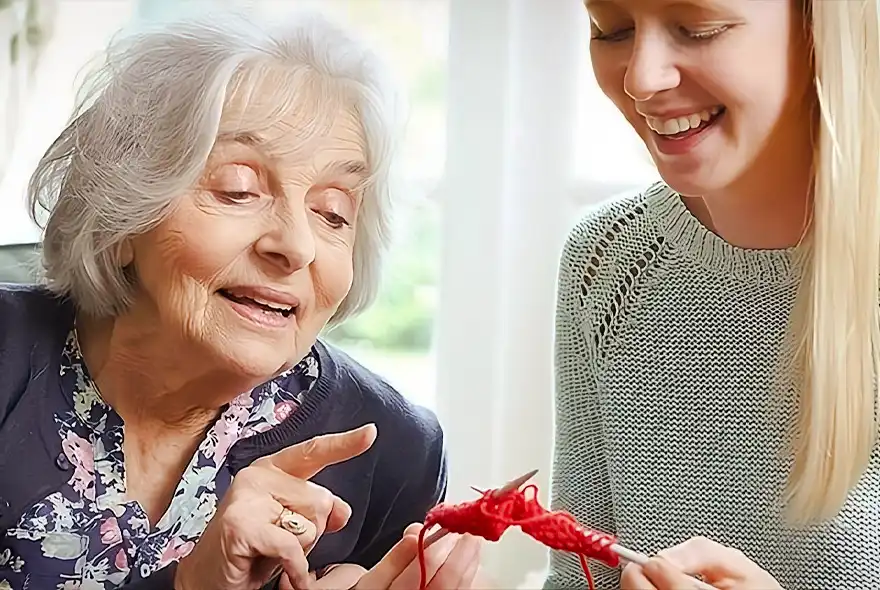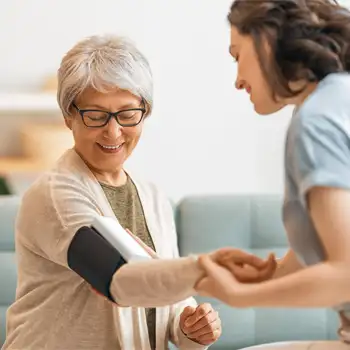At Allevia Home Care, we understand our clients want to be as independent as possible. We all enjoy being able to get dressed, walk, and overall take care of ourselves independently. Unfortunately, as we age or suffer a disability, some simple tasks can become difficult or even impossible to manage on our own.
Most of the time, people have to give up simple routine activities because they can’t take care of it themselves. However, with Allevia’s personal care assistance, this can easily be solved.

Defining Personal Care Services
Personal care services encompass hands-on assistance vital for daily activities that an individual may struggle to perform independently. Often termed as Activities of Daily Living (ADLs) or Instrumental Activities of Daily Life (IADLs), these services play a pivotal role in enabling individuals to maintain residence in their homes rather than transitioning to assisted living facilities or nursing homes.
Personal care options can be tailored to seniors who want to remain in their own homes, or to disabled adults who want to be independent, but just need some help. These options are safer and more effective than group living, because they enhance the quality of life by helping maintain autonomy.
What Do Personal Care Aides Provide
These services span a wide spectrum of both ADLs and IADLs, addressing fundamental yet crucial needs essential for safe independent living.
“Personal care” involves every aspect a person requires to live a comfortable, dignified life. To ensure clients can live safely and independently, our standard services include:

- Bathing
- Dressing and undressing
- Meal Preparation
- Grooming
- Mobility assistance
- Toileting/hygiene assistance
- Eating
- Light Housework
- Companionship and Socialization
- Medication reminders
When to Consider Home Care Services
Recipients of in-home personal care services predominantly encompass the elderly, adults with disabilities, patients recovering from injuries or illnesses, and those managing chronic conditions such as dementia and Alzheimer’s. Unlike home health care services, personal care services are non-medical in nature and often don’t necessitate formal licensing or doctor’s prescription.
You may want to consider personal care if your loved one:
- Struggles with chronic conditions affecting their ability to live independently
- Has difficulty with activities of daily living like dressing, bathing, etc.
- Should not be left alone for long periods of time
- Needs assistance managing health conditions or medications
- Needs someone to go with them to medical appointments, or when they run errands
Benefits of Personal Care Services
Opting for in-home personal care offers several advantages over institutional care, including the ability to sustain independent living in a familiar environment, cost-effectiveness compared to assisted living or nursing homes, tailored care meeting specific needs, and a notable enhancement in quality of life, fostering a sense of independence and strong caregiver-client relationships.
An Allevia Home Care representative can meet with you and your loved one to discuss their needs and make thoughtful recommendations for care. We develop customized care plans that provide clients the support they need while allowing them to maintain their independence.
If you have a relative in need of daily assistance, contact Allevia Home Care. We can bring comfort to your loved one and peace of mind to you. Our compassionate personal care assistants can help your family manage this difficult situation with respect and care. Please don’t hesitate to reach out.
Frequently Asked Questions
Do your senior care aides have special training or qualifications?
Yes, we thoroughly screen applicants and provide ongoing senior care training, so clients receive compassionate, competent assistance.
What Happens If an Elderly Person Has No One to Care for Them?
When elderly individuals find themselves without a caregiver, various support services can step in to provide assistance and ensure their well-being. These services may include:
- Government Assistance Programs: Many governments have social welfare programs designed to support elderly citizens. These programs may offer financial aid, housing assistance, and access to healthcare services.
- Non-Profit Organizations: Numerous non-profit organizations focus on the welfare of the elderly. These organizations often provide services such as meal delivery, transportation, and companionship programs.
- Community Resources: Local communities may offer resources such as senior centers, where the elderly can engage in social activities, receive health check-ups, and access educational programs.
What regions do you serve for in-home care?
We currently provide caregiver services across Aurora, Denver, Colorado Springs and Counties: Adams, Douglas, El Paso, Elbert, Jefferson.
What sets your senior care services apart from competitors?
Our dedication to customized care planning, skilled caregivers, and transparent communication at every step sets us apart. We focus exclusively in seniors.
What are the signs that an elderly person is in need of assistance?
Identifying signs that an elderly person requires assistance is crucial for ensuring their safety and well-being. Common indicators include:
- Changes in Physical Health: Keep an eye out for noticeable declines in mobility, changes in weight, or struggles with personal hygiene.
- Social Withdrawal: If an elderly person becomes increasingly isolated, it may signal a need for companionship or assistance with daily activities.
- Neglected Living Environment: A disheveled or unkempt living space may suggest difficulties in managing household tasks, indicating a need for support.
Who is eligible for Personal Care?
The eligibility criteria for personal care assistance may vary depending on the state and the Medicaid program. In general, home and community-based services are available to eligible persons aged 60 or older and to adults with disabilities between the ages of 18 and 59.
Medicaid is one of the programs that provides personal care assistance through its Medicaid State Plan and Medicaid Waiver programs. To be eligible for Medicaid, specific eligibility criteria must be met, including being a resident in the state in which one applies, financial requirements, and functional requirements.
In addition to Medicaid, there are other programs that provide personal care assistance such as Home and Community Based Services (HCBS) Medicaid Waivers or Section 1115 Demonstration Waivers.
It is important to note that eligibility criteria may differ based on the state and the program. Therefore, it is best to check with your local Department of Health and Human Services or a Medicaid specialist to determine your eligibility for personal care assistance.

